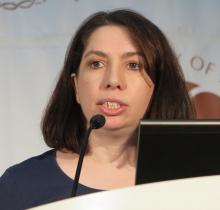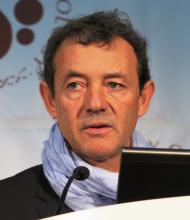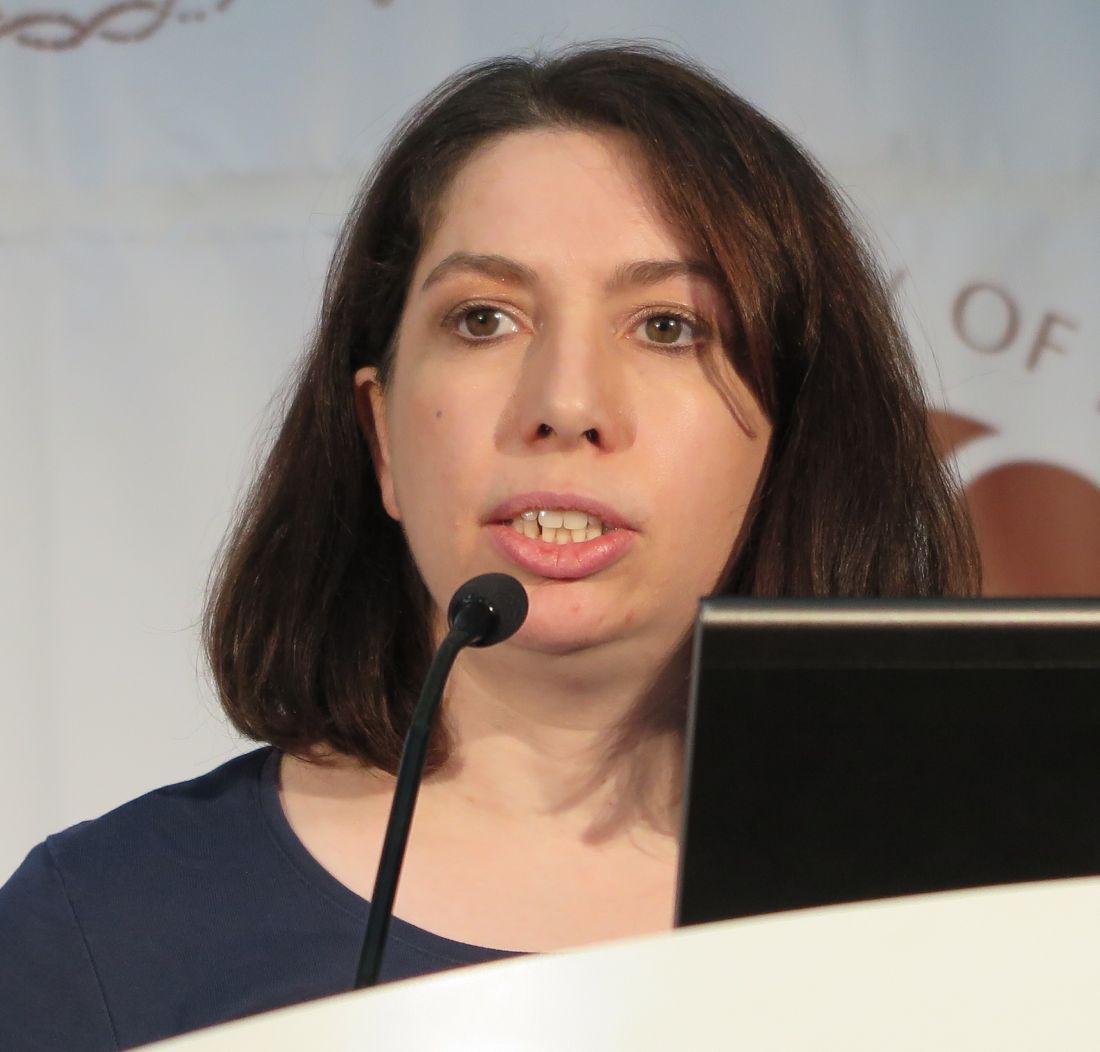User login
SAN DIEGO – For some chronic myeloid leukemia patients with solid, stable remissions, halving their dose of a tyrosine kinase inhibitor – or even stopping therapy altogether, at least temporarily – appears to be safe and to offer both health and financial benefits, European investigators said at the annual meeting of the American Society of Hematology.
In the British De-escalation and Stopping Treatment of Imatinib, Nilotinib, or Sprycel [dasatinib], or Destiny Study, a total of 12 molecular relapses occurred between the second and twelfth month of dose reduction among 174 patients with either an MR3 or MR4 molecular response, and all 12 patients had restoration of molecular remissions after resumption of full dose TKIs, reported co-investigator Mhairi Copland, MD, PhD, from the University of Glasgow, Scotland.
“What we wanted to explore in the Destiny study is cutting the dose of tyrosine kinase inhibitor therapy in CML by half, followed by stopping therapy not just in patients with undetectable disease but also with stable low levels of disease,” Dr. Copland said during a briefing at the meeting.
“We hypothesized that more patients would be able to reduce therapy safely, and a proportion of these would be able to go on to stop therapy; also, that the patients on half-dose therapy would have reduced amount of side effects compared to those on full-dose therapy,” she added.
Several recent studies, including the EURO-SKI trial, have shown that it is safe to stop TKI therapy in those patients who are optimally responding and have undetectable levels of the BCR-ABL transcript.
Rendezvous with Destiny
In Destiny, the investigators enrolled patients with “good, but not perfect” molecular responses: MR3 or better, defined as a minimum of 3 consecutive tests each with greater than 10,000 ABL control transcripts following a minimum of 3 years on a TKI at standard prescribed doses. The median overall duration of TKI therapy was 7 years.
Participants on imatinib had their daily doses reduced to 200 mg, those on nilotinib had their doses cut back to 200 mg twice daily, and those on dasatinib had their quotidian doses halved to 50 mg.
After 12 months of half-dose therapy, molecular recurrence, defined as a loss of MR3 on two consecutive samples, was detected in 9 of 49 patients (18.4%) with MR3 but not MR4 remissions, compared with 3 of 125 patients (2.4%) with MR4 or better remissions (P less than .001).
The median time to relapse was 4.4 months among MR3/not 4 patients vs. 8.7 months for MR4 or better patients.
The probability of molecular recurrence on dose reduction was unrelated to either age, sex, performance status, type of TKI, or the duration of TKI therapy (median 7 years overall).
No patients experienced either progression to advanced phase disease or loss of cytogenetic response. During the course of follow-up, one patient died, and there were 15 serious adverse events, but these were determined to be unrelated to either CML or TKI treatment.
All 12 patients who experienced molecular recurrence regained MR3 within 4 months of resuming TKI therapy at the full dose.
As noted before, patient-reported side effects such as lethargy, diarrhea, rash, nausea, periorbital edema, and hair thinning decreased during the first 3 months of de-escalation, but not thereafter. Dr. Copland said that patients had generally good quality-of-life scores at study entry, suggesting that they were likely not especially bothered by TKI side effects in the first place.
The investigators calculated that for the 174 patients, halving treatment would save an estimated £1,943,364 ($2,474,679) from an expected TKI budget of £4,156,969 ($5,293,484), a savings of 46.7%. Estimated savings were similar for patients with MR4 or better alone (47.7%) and for those with a major molecular response (44.2%).
EURO-SKI Update
Also at ASH 2016, Francois-Xavier Mahon, MD, PhD, from the University of Bordeaux, France, reported additional follow-up data from the EURO-SKI trial, results of which were first reported at the 2016 annual meeting of the European Hematology Association in Copenhagen.
The investigators found that 50% of 755 assessable patients with CML were free of molecular recurrence at 24 months, as were 47% at 36 months.
As reported previously, patients who had been on a TKI for more than 5.8 years before attempting to stop had a lower rate of relapse (34.5%) than patients who had been on therapy for less than 5.8 years (57.4%). Each additional year of TKI therapy was associated with an approximately 16% better chance of successful TKI cessation.
“With inclusion and relapse criteria less strict than in many previous trials, and with decentralized but standardized PCR monitoring, stopping of TKI therapy in a large cohort of CML patients appears feasible and safe,” Dr. Mahon said at the briefing.
The British Destiny Study was supported by Newcastle University. Dr. Copland reported honoraria, advisory board memberships, and/or research funding from Amgen, Pfizer, Shire, BMS, and Ariad.
EURO-SKI was sponsored by the European LeukemiaNet. Dr. Mahon has previously disclosed being on the scientific advisory board and receiving honoraria from Novartis Oncology and BMS, and serving as consultant to those companies and to Pfizer.
SAN DIEGO – For some chronic myeloid leukemia patients with solid, stable remissions, halving their dose of a tyrosine kinase inhibitor – or even stopping therapy altogether, at least temporarily – appears to be safe and to offer both health and financial benefits, European investigators said at the annual meeting of the American Society of Hematology.
In the British De-escalation and Stopping Treatment of Imatinib, Nilotinib, or Sprycel [dasatinib], or Destiny Study, a total of 12 molecular relapses occurred between the second and twelfth month of dose reduction among 174 patients with either an MR3 or MR4 molecular response, and all 12 patients had restoration of molecular remissions after resumption of full dose TKIs, reported co-investigator Mhairi Copland, MD, PhD, from the University of Glasgow, Scotland.
“What we wanted to explore in the Destiny study is cutting the dose of tyrosine kinase inhibitor therapy in CML by half, followed by stopping therapy not just in patients with undetectable disease but also with stable low levels of disease,” Dr. Copland said during a briefing at the meeting.
“We hypothesized that more patients would be able to reduce therapy safely, and a proportion of these would be able to go on to stop therapy; also, that the patients on half-dose therapy would have reduced amount of side effects compared to those on full-dose therapy,” she added.
Several recent studies, including the EURO-SKI trial, have shown that it is safe to stop TKI therapy in those patients who are optimally responding and have undetectable levels of the BCR-ABL transcript.
Rendezvous with Destiny
In Destiny, the investigators enrolled patients with “good, but not perfect” molecular responses: MR3 or better, defined as a minimum of 3 consecutive tests each with greater than 10,000 ABL control transcripts following a minimum of 3 years on a TKI at standard prescribed doses. The median overall duration of TKI therapy was 7 years.
Participants on imatinib had their daily doses reduced to 200 mg, those on nilotinib had their doses cut back to 200 mg twice daily, and those on dasatinib had their quotidian doses halved to 50 mg.
After 12 months of half-dose therapy, molecular recurrence, defined as a loss of MR3 on two consecutive samples, was detected in 9 of 49 patients (18.4%) with MR3 but not MR4 remissions, compared with 3 of 125 patients (2.4%) with MR4 or better remissions (P less than .001).
The median time to relapse was 4.4 months among MR3/not 4 patients vs. 8.7 months for MR4 or better patients.
The probability of molecular recurrence on dose reduction was unrelated to either age, sex, performance status, type of TKI, or the duration of TKI therapy (median 7 years overall).
No patients experienced either progression to advanced phase disease or loss of cytogenetic response. During the course of follow-up, one patient died, and there were 15 serious adverse events, but these were determined to be unrelated to either CML or TKI treatment.
All 12 patients who experienced molecular recurrence regained MR3 within 4 months of resuming TKI therapy at the full dose.
As noted before, patient-reported side effects such as lethargy, diarrhea, rash, nausea, periorbital edema, and hair thinning decreased during the first 3 months of de-escalation, but not thereafter. Dr. Copland said that patients had generally good quality-of-life scores at study entry, suggesting that they were likely not especially bothered by TKI side effects in the first place.
The investigators calculated that for the 174 patients, halving treatment would save an estimated £1,943,364 ($2,474,679) from an expected TKI budget of £4,156,969 ($5,293,484), a savings of 46.7%. Estimated savings were similar for patients with MR4 or better alone (47.7%) and for those with a major molecular response (44.2%).
EURO-SKI Update
Also at ASH 2016, Francois-Xavier Mahon, MD, PhD, from the University of Bordeaux, France, reported additional follow-up data from the EURO-SKI trial, results of which were first reported at the 2016 annual meeting of the European Hematology Association in Copenhagen.
The investigators found that 50% of 755 assessable patients with CML were free of molecular recurrence at 24 months, as were 47% at 36 months.
As reported previously, patients who had been on a TKI for more than 5.8 years before attempting to stop had a lower rate of relapse (34.5%) than patients who had been on therapy for less than 5.8 years (57.4%). Each additional year of TKI therapy was associated with an approximately 16% better chance of successful TKI cessation.
“With inclusion and relapse criteria less strict than in many previous trials, and with decentralized but standardized PCR monitoring, stopping of TKI therapy in a large cohort of CML patients appears feasible and safe,” Dr. Mahon said at the briefing.
The British Destiny Study was supported by Newcastle University. Dr. Copland reported honoraria, advisory board memberships, and/or research funding from Amgen, Pfizer, Shire, BMS, and Ariad.
EURO-SKI was sponsored by the European LeukemiaNet. Dr. Mahon has previously disclosed being on the scientific advisory board and receiving honoraria from Novartis Oncology and BMS, and serving as consultant to those companies and to Pfizer.
SAN DIEGO – For some chronic myeloid leukemia patients with solid, stable remissions, halving their dose of a tyrosine kinase inhibitor – or even stopping therapy altogether, at least temporarily – appears to be safe and to offer both health and financial benefits, European investigators said at the annual meeting of the American Society of Hematology.
In the British De-escalation and Stopping Treatment of Imatinib, Nilotinib, or Sprycel [dasatinib], or Destiny Study, a total of 12 molecular relapses occurred between the second and twelfth month of dose reduction among 174 patients with either an MR3 or MR4 molecular response, and all 12 patients had restoration of molecular remissions after resumption of full dose TKIs, reported co-investigator Mhairi Copland, MD, PhD, from the University of Glasgow, Scotland.
“What we wanted to explore in the Destiny study is cutting the dose of tyrosine kinase inhibitor therapy in CML by half, followed by stopping therapy not just in patients with undetectable disease but also with stable low levels of disease,” Dr. Copland said during a briefing at the meeting.
“We hypothesized that more patients would be able to reduce therapy safely, and a proportion of these would be able to go on to stop therapy; also, that the patients on half-dose therapy would have reduced amount of side effects compared to those on full-dose therapy,” she added.
Several recent studies, including the EURO-SKI trial, have shown that it is safe to stop TKI therapy in those patients who are optimally responding and have undetectable levels of the BCR-ABL transcript.
Rendezvous with Destiny
In Destiny, the investigators enrolled patients with “good, but not perfect” molecular responses: MR3 or better, defined as a minimum of 3 consecutive tests each with greater than 10,000 ABL control transcripts following a minimum of 3 years on a TKI at standard prescribed doses. The median overall duration of TKI therapy was 7 years.
Participants on imatinib had their daily doses reduced to 200 mg, those on nilotinib had their doses cut back to 200 mg twice daily, and those on dasatinib had their quotidian doses halved to 50 mg.
After 12 months of half-dose therapy, molecular recurrence, defined as a loss of MR3 on two consecutive samples, was detected in 9 of 49 patients (18.4%) with MR3 but not MR4 remissions, compared with 3 of 125 patients (2.4%) with MR4 or better remissions (P less than .001).
The median time to relapse was 4.4 months among MR3/not 4 patients vs. 8.7 months for MR4 or better patients.
The probability of molecular recurrence on dose reduction was unrelated to either age, sex, performance status, type of TKI, or the duration of TKI therapy (median 7 years overall).
No patients experienced either progression to advanced phase disease or loss of cytogenetic response. During the course of follow-up, one patient died, and there were 15 serious adverse events, but these were determined to be unrelated to either CML or TKI treatment.
All 12 patients who experienced molecular recurrence regained MR3 within 4 months of resuming TKI therapy at the full dose.
As noted before, patient-reported side effects such as lethargy, diarrhea, rash, nausea, periorbital edema, and hair thinning decreased during the first 3 months of de-escalation, but not thereafter. Dr. Copland said that patients had generally good quality-of-life scores at study entry, suggesting that they were likely not especially bothered by TKI side effects in the first place.
The investigators calculated that for the 174 patients, halving treatment would save an estimated £1,943,364 ($2,474,679) from an expected TKI budget of £4,156,969 ($5,293,484), a savings of 46.7%. Estimated savings were similar for patients with MR4 or better alone (47.7%) and for those with a major molecular response (44.2%).
EURO-SKI Update
Also at ASH 2016, Francois-Xavier Mahon, MD, PhD, from the University of Bordeaux, France, reported additional follow-up data from the EURO-SKI trial, results of which were first reported at the 2016 annual meeting of the European Hematology Association in Copenhagen.
The investigators found that 50% of 755 assessable patients with CML were free of molecular recurrence at 24 months, as were 47% at 36 months.
As reported previously, patients who had been on a TKI for more than 5.8 years before attempting to stop had a lower rate of relapse (34.5%) than patients who had been on therapy for less than 5.8 years (57.4%). Each additional year of TKI therapy was associated with an approximately 16% better chance of successful TKI cessation.
“With inclusion and relapse criteria less strict than in many previous trials, and with decentralized but standardized PCR monitoring, stopping of TKI therapy in a large cohort of CML patients appears feasible and safe,” Dr. Mahon said at the briefing.
The British Destiny Study was supported by Newcastle University. Dr. Copland reported honoraria, advisory board memberships, and/or research funding from Amgen, Pfizer, Shire, BMS, and Ariad.
EURO-SKI was sponsored by the European LeukemiaNet. Dr. Mahon has previously disclosed being on the scientific advisory board and receiving honoraria from Novartis Oncology and BMS, and serving as consultant to those companies and to Pfizer.
FROM ASH 2016
Key clinical point: Halving TKI doses in patients with chronic myeloid leukemia in stable remission is safe and cost effective.
Major finding: After halving TKI doses, there were 12 molecular relapses among 174 patients with an MR3 or better molecular response.
Data source: Prospective dose-reduction study in 174 patients with CML in MR3 remission or better.
Disclosures: The British Destiny Study was supported by Newcastle University. Dr. Copland reported honoraria, advisory board memberships, and/or research funding from Amgen, Pfizer, Shire, BMS, and Ariad. EURO-SKI was sponsored by the European LeukemiaNet. Dr. Mahon has previously disclosed being on the scientific advisory board and receiving honoraria from Novartis Oncology and BMS, and serving as consultant to those companies and to Pfizer.


